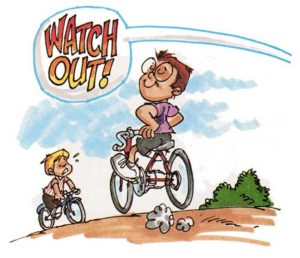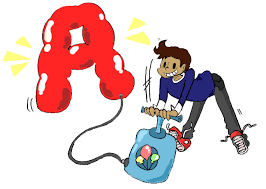by James Burns | Mar 26, 2018 | Academics, Anti Bullying Coaching and Resources, Careless, Teachers, The Bully Proof Classroom
Children today bring home report cards for their parents review about four times during the school year. Parents can attend two to three parent teacher conferences to receive reports on how their children are doing academically and behaviorally. During these conferences teachers at times communicate to parents that their sons or daughters are doing fine, but they need to take their time with their work because they just seem to make careless mistakes. In reality their children are not doing well academically but for some reason teachers feel that poor student performance is a reflection of their teaching ability, not a student’s work ethic. There is only one way to measure a student’s performance and to determine whether a not they have mastered the material that was taught, and that’s by assigning a grade associated with the work that the student completes. Grades like and A. B. C. or 80%, 90%, or 100% are part of reality and children and parents need to be given a clear idea of whether or not the material that was taught was actually mastered with an appropriate grade assigned.
 So, why are children careless? The biggest reason is that teachers from the first grade on accept work that is sub par, and doesn’t communicate the truth to the student or parent that the work submitted is unacceptable. Carelessness just becomes part of life and parents believe their child isn’t academically deficient but just makes careless mistakes, doesn’t pay attention, is a day dreamer, or just plain old lazy. The truth is the child hasn’t mastered the material that was taught.
So, why are children careless? The biggest reason is that teachers from the first grade on accept work that is sub par, and doesn’t communicate the truth to the student or parent that the work submitted is unacceptable. Carelessness just becomes part of life and parents believe their child isn’t academically deficient but just makes careless mistakes, doesn’t pay attention, is a day dreamer, or just plain old lazy. The truth is the child hasn’t mastered the material that was taught.
The way for teachers to resolve the problem is to raise their level of expectation and to put in place more stringent grading practices that give a true indication of the student’s performance. By doing this students will have a better understanding of their abilities, and when taken seriously will motivate the student to pay attention, and to be more careful with the work that is turned in.
Revise – Re-do – Retake
To start this process any work that that is handed in whether it is homework, class work, tests, or quizzes should never just be handed back to the student with the mistakes noted. The work should be handed back with the mistakes noted and with the understanding that if the student grade was 80% or less the entire assignment must be done again. It may take a few re-do’s but once the student gets the idea that certain grades are unacceptable they will be less careless and more careful when they turn in assignments the first time. This not only motivates the student but gives them the opportunity to master material that would otherwise just be handed back to them with a poor grade. Students must revise writing assignments, re-do, careless work, and retake tests if their grade was 80% or less.
Poor academic performance is a result of students not having the necessary pre requisite skills to perform at a higher level. The only way to resolve the problem is to go back to the academic areas that were not mastered by the student and make them repeat the areas of deficiency until mastered. To a school district this can be costly and create a great deal of parental and community discord. So, by today’s standards that is almost impossible to do. Why not be tougher on students academically the first time around and really get them to master the material that is being taught. Stop using the excuse that the students are careless and start using tougher grading practices that will make students more careful and most of all more responsible for their academic progress..
Helping Students Retain Information
by James Burns | Mar 15, 2018 | Bully Proof Classroom, Dealing with Angry And Irate Parents
 This doesn’t mean you should start an argument. It means that when a bullying parent has a concern, as unrealistic as it might be; let them know that their concern is your concern. If they come in and are agitated, meet their intensity with your own intensity. When they present a problem to you respond with something like “I am so happy you made me aware of this. Now let’s work together to straighten things out,” parents can be reactive, argumentative, and angry. They may lack the social and emotional equity to deal with issues that are placed in front of them by their own child. They rely on the responses that they have learned from others through observation, and many of the behaviors that they exhibit are part of their own intergenerational tendencies.
This doesn’t mean you should start an argument. It means that when a bullying parent has a concern, as unrealistic as it might be; let them know that their concern is your concern. If they come in and are agitated, meet their intensity with your own intensity. When they present a problem to you respond with something like “I am so happy you made me aware of this. Now let’s work together to straighten things out,” parents can be reactive, argumentative, and angry. They may lack the social and emotional equity to deal with issues that are placed in front of them by their own child. They rely on the responses that they have learned from others through observation, and many of the behaviors that they exhibit are part of their own intergenerational tendencies.
[ecwid_product id=”117516101″ display=”picture title price options addtobag” version=”2″ show_border=”1″ show_price_on_button=”1″ center_align=”1″]
by James Burns | Mar 14, 2018 | Anti Bullying, Anti Bullying 101, Anti Bullying Tips, James Burns, Parents, The Bully Proof Classroom, Uncategorized
 Some parents have lost their perception of right and wrong behaviors, and sometimes even simple decisions are tough. It’s these parents that will try to bully the teacher and the school. They do not have the ability to cooperate when they disagree and can wreak havoc in an educational setting. These parents need to be agreed with immediately. You heard right; agreed with. But, agree in principal, not with the content. Let them know that you can see things from their perspective, but work with them to see things from your perspective. Instead of a tug of war, move to their side of the rope. Or better The young parents of today need parenting. Parents who have left home with a rebellious attitude may not even be speaking with their own parents yet, let go of the rope. Ease into conversations with these parents and lose your fear of being yelled at. Be an empathic listener, and don’t argue. They need to be taught, and you are going to do it.
Some parents have lost their perception of right and wrong behaviors, and sometimes even simple decisions are tough. It’s these parents that will try to bully the teacher and the school. They do not have the ability to cooperate when they disagree and can wreak havoc in an educational setting. These parents need to be agreed with immediately. You heard right; agreed with. But, agree in principal, not with the content. Let them know that you can see things from their perspective, but work with them to see things from your perspective. Instead of a tug of war, move to their side of the rope. Or better The young parents of today need parenting. Parents who have left home with a rebellious attitude may not even be speaking with their own parents yet, let go of the rope. Ease into conversations with these parents and lose your fear of being yelled at. Be an empathic listener, and don’t argue. They need to be taught, and you are going to do it.
by James Burns | Mar 10, 2018 | Behavior Management, Bully Proof Classroom, Parents
 When kids are unhappy about something that happens in school and they believe that the teacher was the culprit, they will usually go home and complain to mom or dad. If the parents are weak, and are in a position of being intimidated by their own children, they will usually go to the school and argue for their child. Why? Because they can win the argument with the school, but they will always lose the argument with their own kid. I experienced this once: a child bullying his mother in my office. My response to the kid was, “don’t bully your mother in my office.” When this was said, the mom felt she now had an ally and became more assertive with her son. Husbands and wives may disrespect each other in the home in front of the children. Sometimes children will become one of the parents’ confidants and will have to listen to complaints about one parent or the other. Anytime you have an opportunity to stick up for or defend a parent when they are being bullied by their own child in your presence, do it. You will make a new friend, and your disciplining of that child will be easier going forward.
When kids are unhappy about something that happens in school and they believe that the teacher was the culprit, they will usually go home and complain to mom or dad. If the parents are weak, and are in a position of being intimidated by their own children, they will usually go to the school and argue for their child. Why? Because they can win the argument with the school, but they will always lose the argument with their own kid. I experienced this once: a child bullying his mother in my office. My response to the kid was, “don’t bully your mother in my office.” When this was said, the mom felt she now had an ally and became more assertive with her son. Husbands and wives may disrespect each other in the home in front of the children. Sometimes children will become one of the parents’ confidants and will have to listen to complaints about one parent or the other. Anytime you have an opportunity to stick up for or defend a parent when they are being bullied by their own child in your presence, do it. You will make a new friend, and your disciplining of that child will be easier going forward.
by James Burns | Feb 28, 2018 | Bully Proof Classroom, James Burns, Uncategorized

Too often teachers award a grade of an “A” or a “B” to a student, when in reality the student doesn’t know the material and a more realistic grade would be a “C” or even a “D.” Parental or administrative pressure or curriculum timelines can place you in a position of awarding a grade that is not in line with your student’s actual performance or ability. This is more of a problem for the student and the student’s parents than for you. Students who have an inflated view of their own ability move on to the next marking period or the next grade with a lethal combination: an inflated view of their academic ability (overconfidence) and a lack of the prerequisite skills they need to succeed. This cockiness combined with the students perception of their true ability can produce anger-related issues that could translate into bullying behavior. These students ultimately become behavioral and academic problems for another teacher who often will blame you for the problem. Plus, another huge problem that arises is that the student’s parents also develop the same inflated view of their child’s ability. This grade inflation only produces future pain for the student, the parents, any of the student’s future teachers, and maybe even you, down the road.
 So, why are children careless? The biggest reason is that teachers from the first grade on accept work that is sub par, and doesn’t communicate the truth to the student or parent that the work submitted is unacceptable. Carelessness just becomes part of life and parents believe their child isn’t academically deficient but just makes careless mistakes, doesn’t pay attention, is a day dreamer, or just plain old lazy. The truth is the child hasn’t mastered the material that was taught.
So, why are children careless? The biggest reason is that teachers from the first grade on accept work that is sub par, and doesn’t communicate the truth to the student or parent that the work submitted is unacceptable. Carelessness just becomes part of life and parents believe their child isn’t academically deficient but just makes careless mistakes, doesn’t pay attention, is a day dreamer, or just plain old lazy. The truth is the child hasn’t mastered the material that was taught.








